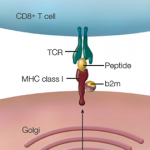Over the last several years, the evidence has been mounting that our commensal gastrointestinal microflora are far more than simply benign inhabitants of our alimentary canal. “A lot of noninfectious human disease is associated with abnormalities of the gut microbiota,” Jeremy Nicholson, MD, chair in biological chemistry and head of the department of surgery and cancer at Imperial College in London, U.K., told a symposium at the 2011 annual meeting of the American Association for the Advancement of Science, mentioning gastric ulcers, colon and other cancers, several autoimmune diseases, and type 2 diabetes, among other diseases. “We’re less than 1% human in terms of active genes in the body,” he said, explaining the influence of our microbiome’s genetics on our health.
Now a new study suggests that a small abnormality in an immunity gene can alter the gut flora in a way that induces development of rheumatoid arthritis. The research was published in the PLoS ONE.
“Our working hypothesis was that host immune response genes affect the microbes we carry, and that this may alter the risk of arthritis development,” says principal investigator Veena Taneja, PhD, an immunologist at the Mayo Clinic in Rochester, Minn. “We developed transgenic mice that carry the human HLA genes, DRB1*0401 and DRB1*0402, known, respectively to predispose and to resist development of rheumatoid arthritis.” As with humans, she says, among the mouse models in her study, three times as many females as males among the susceptible cohort developed the disease.
The researchers collected fecal samples from both groups of mice at varying ages. They used high throughput sequencing technology (16s sequencing) to map the populations of bacteria in naive mice from both strains. “The guts of arthritis-susceptible mice were dominated by clostridium-like bacteria, and that was associated with a proinflammatory immune profile,” says Dr. Taneja. “Further, we found that mice carrying the arthritis-susceptible HLA gene lacked the dynamic change that occurs among the gut flora as the mice age, while the mice with the nonsusceptible gene showed that dynamic change.”
The study, the first to explore the murine microbiome in humanized mice, is potentially highly significant, says Martin Kriegel, MD, PhD, assistant professor of immunobiology and medicine at Yale University School of Medicine in New Haven, Conn. “Other commensals … have been shown to drive the autoimmune process in the spontaneous arthritis model called K/BxN,” he says. “Once the disease-associated commensals identified in this study have been proven to be causally related to arthritis development, the potential for translation of these findings to novel biomarkers, or even novel therapeutic approaches for rheumatoid arthritis, is likely greater than with nonhumanized mouse models.”


